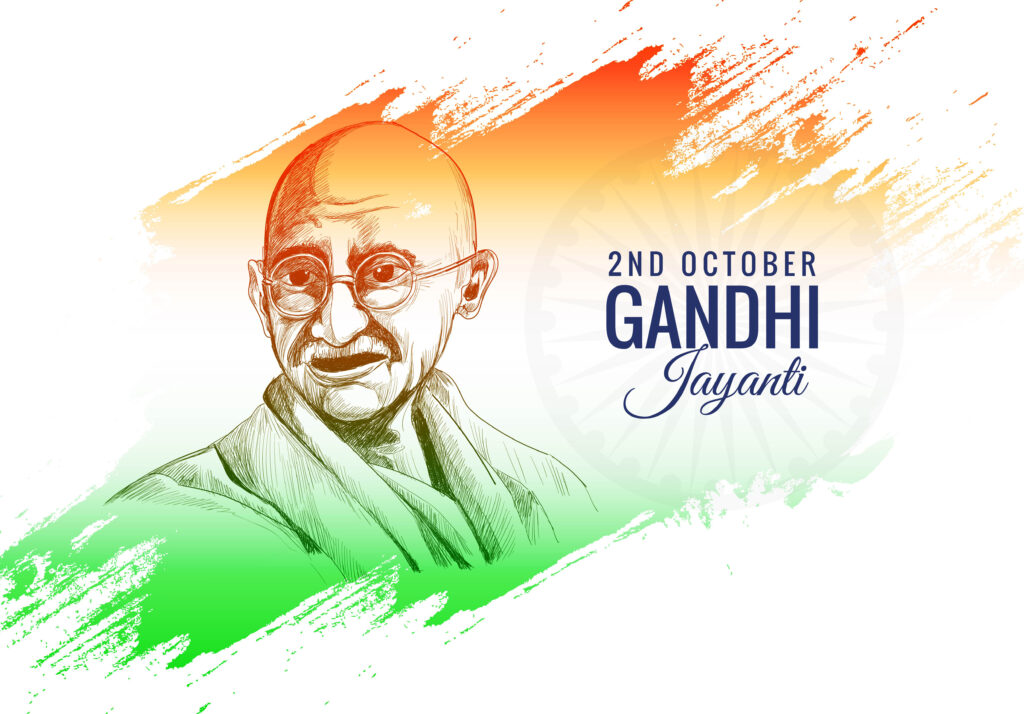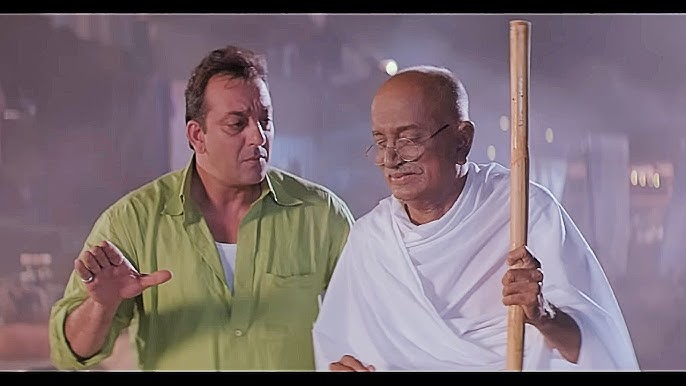On October 2nd, we celebrate Gandhi Jayanti, honouring the legacy of Mahatma Gandhi, a leader whose simple yet powerful ideas transformed the world. Have you ever wondered what solutions Gandhi would propose if he were alive today? Imagine how he could creatively address today’s biggest global challenges. Gandhi was never intimidated by modern issues, and he would still inspire deep, meaningful change—adapted to our current times. Here’s how Gandhi might surprise us with his wisdom, applied in fresh and modern ways.

1. Climate Change and Environmental Degradation: Gandhi’s Green Revolution
Gandhi could lead an “Earth Satyagraha,” a global non-violent movement for the planet. Picture millions of people fasting, not for political reasons, but to demonstrate that consuming less helps reduce environmental harm. His core message? “Live simply so others, including the Earth, can live simply too.“
- Urban Villages: Gandhi would encourage cities to operate like sustainable villages, with rooftop gardens, zero-waste practices, and shared green spaces where technology and nature peacefully coexist.
- Personal Responsibility: Gandhi would advocate for carbon ahimsa, where individuals reduce their carbon footprints as an act of non-violence toward the planet.
2. Income Inequality: Trusteeship in the Age of Billionaires
Instead of opposing the ultra-rich, Gandhi would promote a more creative solution. He would encourage billionaires and big companies to embrace “Trusteeship 2.0.” Rather than demanding that they give up wealth, Gandhi would ask them to see their riches as a resource held in trust for society’s benefit.
- Wealth Commitments: Imagine a world where billionaires pledge to live simply and use their excess wealth to uplift the poor through education, healthcare, and infrastructure development.
- Decentralized Digital Economy: Gandhi would likely support blockchain and community-based economies, creating a digital “village economy” where people trade and support each other, minimizing corporate greed.
3. Global Conflicts and Political Tensions: Digital Satyagraha for Peace
Gandhi would revolutionize conflict resolution through Digital Satyagraha. Instead of violence, he would promote peace using tweets and viral posts, sparking a worldwide movement for non-violence. Imagine global ceasefires initiated by the collective conscience of millions online.
- Moral Diplomacy: Gandhi would promote Moral Diplomacy, where nations resolve conflicts through peaceful discussions broadcast live online, holding leaders accountable.
4. Racism and Social Injustice: Virtual Reality (VR) for Global Unity
In today’s world, Gandhi could turn the fight against racism into a global virtual experiment. Imagine Gandhi spearheading a worldwide truth and reconciliation process through virtual reality (VR), enabling people to experience life from different racial and ethnic perspectives.
- Empathy Initiatives: Gandhi might introduce Empathy Initiatives, global VR experiences that allow individuals to “live” as someone from a different background, fostering deeper understanding and unity.
5. Mental Health Crisis: Gandhi’s Revolution for Inner Peace
Gandhi, a firm believer in self-control and inner peace, would likely lead a movement focused on mental well-being. He could introduce “Mindfulness Satyagraha,” encouraging people to break free from consumerism, social media addiction, and burnout culture.
- Mental Swadeshi: Gandhi would encourage mental self-reliance, where people reduce dependence on modern distractions and cultivate inner peace through meditation, physical labour, and nature.
- Silent Satyagraha: He might initiate a global movement of weekly silent protests, where people disconnect from social media and technology for a day to focus on their mental health.
- Tech Detox as a Protest: Imagine Digital Fasts, where people abstain from social media and unnecessary apps for 24 hours as a form of protest against big tech monopolies, reclaiming human connection and focus.
6. Political Corruption: Transparency as the New Non-Violence
Gandhi would revolutionize governance with an emphasis on transparency. Instead of just exposing corruption, he would promote openness as a regular practice in politics.
- Public Accountability Councils: Gandhi would advocate for local Public Accountability Councils, where communities regularly scrutinize government actions. Imagine public offices with transparent walls and decision-making processes broadcast live.
- Satyagraha of Truth-Telling: Gandhi would push for Truth-Telling Days, where politicians and citizens openly admit their mistakes and pledge to govern ethically.
7. Global Health Crises: Community Support Systems
If Gandhi faced a pandemic like COVID-19, he would encourage communities to build self-sufficient healthcare systems, reducing the strain on global resources. These systems wouldn’t just provide medical care but also focus on mental, physical, and spiritual well-being.
- Gandhian Healthcare: Gandhi would likely merge traditional medicine with modern science, supporting both Ayurveda and vaccines, as well as preventive practices like clean living, healthy eating, and fasting for health.
The Importance of Gandhi’s Ideas in Today’s World: A Lesson from ‘Lage Raho Munna Bhai’

A great example of Gandhi’s continuing relevance is seen in the Bollywood film ‘Lage Raho Munna Bhai.’ In the movie, the character Munna Bhai, a kind-hearted gangster, follows Gandhi’s principles in daily life. Through Gandhigiri, Munna Bhai solves modern problems using peace, truth, and kindness. This film beautifully illustrates that Gandhi’s simple, peaceful methods still work in today’s world. It teaches us that even small, non-violent actions can create meaningful change—a lesson Gandhi would surely endorse for modern times.
Conclusion
In today’s complex world, Gandhi’s principles offer solutions beyond surface-level fixes. His ideas address the deeper issues of human greed, conflict, and disconnection. By promoting simplicity, kindness, and responsible use of technology, Gandhi’s modern solutions would inspire us to create a better, more connected world for everyone. Adapting to today’s challenges, his timeless wisdom remains more relevant than ever.